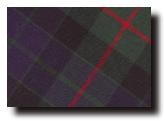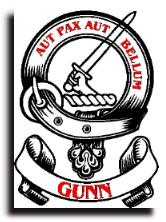
 The name originated from a Norse personal name "Gunni" (which means "war"). The first Gunni came to Caithness at the end of the 12th century when his wife inherited land there from her brother who was Jarl (Earl) of Orkney. Gunni's wife was descended from St Ragnvald who founded the St Magnus Cathedral in Kirkwall. Gunni's Viking grandfather had been killed in 1171 on a raid on Dublin. Orkney, Shetland and Shetland were still part of Norway at this time.
The name originated from a Norse personal name "Gunni" (which means "war"). The first Gunni came to Caithness at the end of the 12th century when his wife inherited land there from her brother who was Jarl (Earl) of Orkney. Gunni's wife was descended from St Ragnvald who founded the St Magnus Cathedral in Kirkwall. Gunni's Viking grandfather had been killed in 1171 on a raid on Dublin. Orkney, Shetland and Shetland were still part of Norway at this time.
Although Ottar, a descendant of Gunni, is known to have lived around 1280 and is the assumed progenitor of the Gunn chiefs, the first chief of the clan to be recorded with certainty was George Gunn who was the coroner of Caithness in the 15th century. He was known as "Am Braisdeach Mor" or "the great brooch-wearer" from his insignia as coroner. He had a castle at Clyth on the east coast of Caithness. A number of separate lines of Gunns became established in Braemore (known as the Robson Gunns), Killearnan, Kildonan and also the Caithness Hendersons and Williamsons.
There is evidence that at the end of the 14th century Sir James Gunn accompanied Sir Henry Sinclair, Earl of Orkney, to North America, nearly one hundred years before Christopher Columbus.
The Gunns became established in the highland areas of Caithness and they were frequently in conflict with the clan Keith. The source (excuse?) for the feud was said to have been when Dugald Keith, who had been spurned by a daughter of Gunn of Braemor, surrounded her home, killed a number of the inhabitants and carried her back to Ackergill Castle. She then threw herself from the tower there rather than submit. There were frequent battles over the years with considerable loss of life. Towards the end of the 15th century a "battle of champions" was agreed with twelve horsemen on each side. But the Keiths turned up with two men on each horse and slaughtered the Gunns. Among the dead were the chief and his four sons who were killed despite taking refuge in the chapel of St Tyr. The grandson of the murdered chief was the first to hold the title "MacSheumais Chataich" (son of James of Caithness, his father). The feud was finally settled in a formal Treaty of Friendship - in 1978.
In 1586 the Sinclair Earls of Caithness and the Gordon earls of Sutherland agreed a pact to destroy the clan Gunn and in order to strengthen their position Gunn of Killearnan married the sister of the chief of the clan Mackay. However, the lands of Killearnan were not lost through battle but by debt. They later obtained land at Badenloch and tried to establish themselves with all the accoutrements of a Highland chief.
In the 17th century, Sir William Gunn who was a brother of the Robson chief, rose to be a battalion commander in the service of the king of Sweden and then fought for King Charles I who gave him a knighthood in 1639. He later married a German baroness and became an imperial general in the Holy Roman Empire.
The Gunns did not become involved in the 1715 Jacobite Uprising and when Bonnie Prince Charlie raised his standard in 1745 the Gunns fought on the side of the Hanoverian government. The Gunns suffered greatly as a result of the Highland Clearances in the 19th century and many emigrated or were forced to move to other areas of Scotland. The direct line of the chief ceased in 1821 but there are moves to prove the genealogical credentials and to have a new chief declared by the Court of the Lord Lyon.
In modern times the novelist Neil M Gunn wrote many books based on his childhood on the coast of Caithness.
The Gunn clan motto is "Aut Pax Aut Bellum" which means "Either peace or war".
Surnames regarded as septs (sub-branch) of the Gunn clan include Enrick, Gallie, Gaunson, Georgeson, Jameson, Jamieson, Kean, Keene, MacComas, MacCorkill, MacCorkle, MacIan, MacKames, MacKeamish, MacKean, MacManus, MacRob, MacWilliam, Mann, Manson, Nelson, Robinson, Robison, Robson, Ronald, Ronaldson, Sandison, Swan, Swanson, Will, Williamson, Wilson, Wylie.
Gunn is still one of the top twenty surnames in the Highland region of Scotland according to the General Register Office.
There is a Gunn clan Web sites here.



